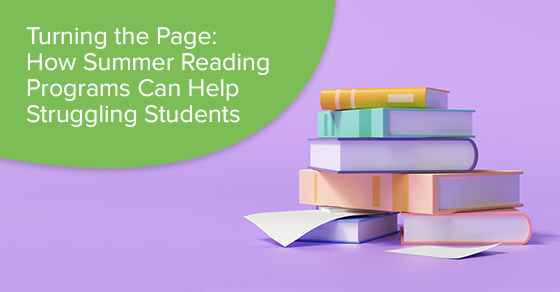Summer vacation can be a time of relaxation and fun for children, but it can also lead to a significant backslide in academic progress. Research has shown that students can lose up to two months of reading progress during the summer months, which can put them at a disadvantage when they return to school in the fall. This is where summer reading programs can make a difference, especially when delivered through one-to-one tutoring.
Linda Cameron, associate professor emeritus at the Ontario Institute for Studies in Education, has written about the importance of reading remediation programs in helping students succeed in school. "Summer reading programs can help students maintain and even improve their reading skills over the summer months. This can have a significant impact on their academic success, as reading is an essential skill for learning across all subject areas. Programs that are tailored to students' individual needs and interests can be particularly effective in engaging them and fostering a love of reading that can last a lifetime."
There are many reasons why students have difficulty with reading:
Limited exposure to print: Students who have limited exposure to materials such as books, magazines, and newspapers, may struggle with reading. This may be due to a lack of familiarity with print, as well as limited vocabulary and comprehension skills.
Weak phonological awareness: Phonological awareness is the ability to recognize and manipulate the sounds in language. Students with poor phonological awareness may struggle with decoding words and recognizing sight words, which can make reading difficult.
Limited vocabulary: Students with limited vocabulary (often a consequence of weak phonological awareness) may struggle to understand what they are reading, as they may not be familiar with the words used in the text.
Poor comprehension skills: Students may have trouble understanding what they are reading, even if they are able to decode words and recognize sight words. This can be caused by a lack of background knowledge, limited vocabulary, or difficulty with inferencing and making connections between ideas.
Attention and focus issues: Students who have problems with attention and focus may have difficulty staying engaged with reading materials, which can make it challenging to develop strong reading skills.
Learning disabilities: Students with learning differences, such as dyslexia, may struggle with reading because of problems with decoding, recognizing sight words, and comprehending text.
Emotional and behavioral issues: Students who are trying to manage such issues may have trouble focusing on reading, processing information, and retaining what they have learned.
It’s important for educators and parents to identify these challenges early and provide targeted interventions to support their child’s reading development. Many students appear to be reading when they are only sight-reading, and not understanding what they read. They make up for their lack of skill by guessing the meaning of the text in a sentence and identifying the words they have memorized. This is referred to as compensating. When students sight-read, it strains their working memory, which further reduces their ability to comprehend. On the surface, it may look like reading is fluent, but it is challenging. There is very little working memory and attention available to understand what is being read.
Struggling readers require explicit, structured reading instruction (teaching that leaves nothing to chance and makes no assumptions). Students with reading difficulties do not catch up without systematic and intensive intervention and practice; this involves considerable time on task, consistency, duration of instruction, and evidence-based approaches based in reading science. Reading is not innate, it is a skill that must be taught, and some students require direct instruction to be successful readers.
Putting the Student First
Individual tutoring is one of the oldest and most effective forms of instruction, as it provides students with resources that can be difficult to access in a traditional classroom setting. Its benefits include:
Personalized Attention and Support
In a traditional classroom setting, teachers must divide their attention among many students, making it difficult to provide individualized instruction. With one-to-one tutoring, students receive help from a dedicated reading tutor who can tailor the instruction to meet their specific needs. This customized support can be especially beneficial for struggling readers, who may require extra assistance to make progress in their reading skills. This targeted instruction helps students improve their abilities and builds their self-confidence as readers.
Flexibility and Convenience
Online individualized tutoring sessions can be scheduled at a time that works best for the student and their family, making it easy to squeeze sessions into a busy summer schedule. Additionally, it can be done from the comfort of the student's home, eliminating the need for travel and making tutoring sessions more accessible for families who may live in rural areas or have limited transportation options. This flexibility and convenience can be especially important for students who have other summer commitments, such as sports or family vacations. With online tutoring, students can receive the support they need to maintain their reading skills, without sacrificing other important summer activities.
Improved Reading Skills and Confidence
Of course, the primary benefit of summer reading programs is the improvement in reading skills and self-esteem that students can achieve. Studies have shown that summer reading programs can significantly improve students' reading abilities, helping to prevent the "summer slide" and keep students on track for success when they return to school in the fall.
Increased Motivation and Engagement
Summer reading programs delivered through one-to-one tutoring can also increase students' motivation and engagement in reading. By providing personalized attention and support, tutors can help students find reading materials that are interesting and engaging to them, which can make a significant difference in their willingness to read. Additionally, tutors can help students set achievable reading goals and track their progress, which can provide a sense of accomplishment and enthusiasm to continue reading.
Reading Specialists to the Rescue
Tutors provide a range of support and assistance to help their students improve their reading skills:
- Providing personalized attention and support tailored to each student's needs,
- Identifying areas of weakness and targeting instruction to address those areas,
- Recommending appropriate reading materials to match each student's interests and reading level,
- Setting achievable reading goals and tracking progress toward those goals,
- Providing feedback and encouragement to build students’ confidence and motivation,
- Using a variety of teaching methods and strategies to engage students in reading and improve their comprehension, and
- Teaching vocabulary and other reading skills to support students' overall reading development.
Why Choose Evoke Learning?
Evoke’s summer reading program is designed to help students in both French immersion and the English stream maintain and improve their skills and build their confidence as readers, as well as prepare them to transition to the next grade. We offer:
Individualized support: Our summer reading program is tailored to each student's individual needs and offer lots of opportunity for learning and practice. This allows for targeted instruction that can help students overcome specific reading challenges and make progress in their reading skills. One-to-one instruction also offers privacy for those students who may feel embarrassed about their deficits.
Experienced reading specialists: Our reading program is led by experienced practitioners who have expertise in working with struggling readers. They provide high-quality instruction and support to help students succeed.
Evidence-based approach: We follow research-based practices for improving reading skills, including phonics instruction, comprehension strategies, and fluency-building exercises. This ensures that students receive instruction that is proven to be effective.
Flexible scheduling: We offer a variety of scheduling options, which allows students to participate in the program at a time that works best for them. This can be particularly beneficial for students with busy schedules, who are spending time at the cottage, or who live in different time zones.
Online delivery: Our programs are delivered remotely, which means that students can participate from anywhere with an internet connection. This is convenient for students who are traveling.
The goals of our summer reading program are:
- To teach students phonological awareness, phoneme awareness, and letter-sound correspondence through direct, explicit, and systematic instruction,
- Improve the student's decoding and encoding skills,
- Increase word-level reading fluency,
- Improve spelling skills through explicit instruction,
- Teach vocabulary development strategies,
- Teach reading comprehension strategies, and
- Ensure access to and active use of assistive technology (most especially for tests) until reading skills are proficient.
Are you curious about our methods and outcomes? Contact us for a free consultation and learn more about how our reading program can help your child experience success this summer.



